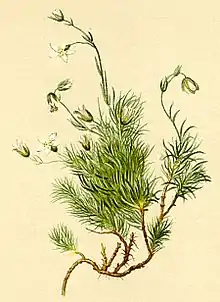Minuartia recurva
Minuartia recurva, the recurved sandwort or sickle-leaved sandwort,[2] is a rare tufted, calcifugous chamaephyte perennial herb of the family Caryophyllaceae. It blooms from late spring to the end of summer.[3]
| Minuartia recurva | |
|---|---|
 | |
| In the Atlas der Alpenflora (1882) | |
| Scientific classification | |
| Kingdom: | Plantae |
| Clade: | Tracheophytes |
| Clade: | Angiosperms |
| Clade: | Eudicots |
| Order: | Caryophyllales |
| Family: | Caryophyllaceae |
| Genus: | Minuartia |
| Species: | M. recurva |
| Binomial name | |
| Minuartia recurva | |
| Synonyms | |
Description
This perennial, densely tufted, hairy plant has a woody base and flowering stems up to 15 cm (6 in) in length. The stems are wiry and lignified, with acicular leaves with three veins, curving to the side to a greater of lesser extent. The flowers are grouped in glandular flower-heads, the individual flowers being white and five-petaled. The inflorescence is a 1–8-flowered cyme. Sepals are 3 to 6 mm (0.12 to 0.24 in) long with 5–7 veins and are ovate-lanceolate; petals are 4 to 8 mm (0.16 to 0.31 in) long and ovate. The fruit is an ovoid capsule up to 5 mm (0.20 in) in length.[4]
Distribution
Minuartia recurva is found in mountainous regions of southern Europe and southwest Asia.
It is also found in Ireland's Caha Mountains, first noted there in 1964.[5][6]
Gallery
 M. recurva in the Canton of Valais
M. recurva in the Canton of Valais M. recurva in the Pyrenees
M. recurva in the Pyrenees M. recurva in Berlin-Dahlem Botanical Garden and Botanical Museum
M. recurva in Berlin-Dahlem Botanical Garden and Botanical Museum
References
- "Minuartia recurva : Recurved Sandwort - NBN Atlas". species.nbnatlas.org.
- "Minuartia recurva (MTIRE)[Overview]- EPPO Global Database". gd.eppo.int.
- Dang, Xiaodong (1 September 2012). "Application of High Resolution Melting analysis for haplotype detection in phylogeographic research and case studies of Arenaria ciliata, A. norvegica and Minuartia recurva (Caryophyllaceae)" – via mural.maynoothuniversity.ie.
- Walters, Stuart Max; Cullen, James (10 April 1984). The European Garden Flora: A Manual for the Identification of Plants Cultivated in Europe, Both Out-of-doors and Under Glass. Cambridge University Press. ISBN 9780521361712 – via Google Books.
- "Minuartia recurva - Online Atlas of the British and Irish Flora". www.brc.ac.uk.
- "Irish botanical news: March 2000" (PDF). The Committee for Ireland Botanical Society of the British Isles. 2000. pp. 32, 42. Retrieved 30 March 2020.